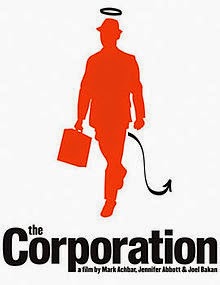Pharmaceutical companies are big corporations, and they are
obligated by law to serve their shareholders and investors by selling as much
product as they can, to as many people as they can, for as long as they can, and
for as much money as they can. Individuals who may be suffering from some
mental discomfort are a ready market for these products.
 |
| documentary film |
“The corporation can
neither recognize nor act upon moral reasons to refrain from harming others.
Nothing in its legal makeup limits what it can do to others in pursuit of its
selfish ends, and it is compelled to cause harm when the benefits [for the corporation
and her shareholders] outweigh the costs.” –Joel Bakan, “The Corporation”
But it’s complicated, and here’s why. Individuals suffering
mental distress are encouraged to see a doctor. The underlying assumptions are
that mental distress is a physical condition that can be fixed, or at least treated
and mediated, by physical/chemical means, and/or that, as individuals, we are
incapable of coping with the slings and arrows of life’s misfortunes without
professional help.
Doctors, meanwhile, are busy people. They almost always have
their patients’ best interests at heart, but their time is limited and doctor visits
are expensive. Typically, patient/doctor contact time might be just ten or fifteen
minutes. In that time, the patient needs to explain the problem, the doctor
needs to consider treatment options, and then there is just enough time to make
a recommendation to the patient. Clearly, there isn’t enough time or expertise
allocated here to fix the patient’s stressful job, broken relationship,
grieving heart, financial crisis, victimization/abuse, or spiritual emergency
(all conditions that often appear at the core of mental distress). But there is
time enough to write a prescription, which the patient can fill in his or her
own time and take without further ado. Even if the pills don’t work, or are
only marginally effective, the placebo effect means the patient is likely to
feel better. After all, they came with the doctor’s recommendation, didn’t
they? And we trust our doctors.
Pharmaceutical companies are pretty canny. They know doctors
are short on time, so they make it easy for doctors to want to promote their drugs by providing supportive
literature for their products, free samples for patients to try, advertisements
in medical journals, and copies of research studies that demonstrate the
benefits of their products. Many even provide quick checklist questions for
doctors to use with patients to determine if a particular drug is appropriate. And
keep in mind they want their drug(s) to be found appropriate—they are in sales after
all. (Unlike other diseases, there are no physical tests that can be run for
mental illnesses.)
Further support for drug treatment over therapy or
counselling comes from insurance companies and government bodies,
corporate-type organizations who also want quick, cheap treatments. And let’s
face it, pills are cheap to make and quick and easy to prescribe. So quick and
easy and cheap, in fact, that about 20% of the folks in the western world are taking one
or more psychiatric medication.
 |
| Available at Amazon |
There’s a lot more to this story, including a fascinating
history of how and why we ended up (as a society) believing in bio-medical
causes and cures for psychiatric illness, and indeed, how we define psychiatric
illness to begin with. Just how do we diagnose this stuff anyway? (And thereby hangs an interesting tale of
commercial evolution!) And do chemical cures work? I have explored those themes
in more depth in my new book Reframing Mental Illness, where I also offer some alternative perspectives for both
the problem and the “cure”.
If you find this topic of interest, read the book!
Other articles I’ve posted in this blog on the topic of
mental health include
No comments:
Post a Comment
Thank you for your feedback. Allow time for it to be posted.